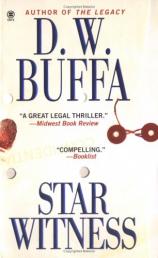Star Witness
Review
Star Witness
When you're scheduling your reading time, block out a large enough chunk to read STAR WITNESS --- twice. You're going to need every minute of it. STAR WITNESS succeeds on several levels, not the least of which is that it is perhaps the ultimate novel about how the film industry works --- and how it does not.
STAR WITNESS is the fifth novel by former defense attorney D.W. Buffa. Over the course of five novels, his protagonist Joe Antonelli has been moving southward down the West Coast --- beginning in Portland, down to San Francisco and Sausalito. As STAR WITNESS opens, readers find Antonelli to be still ensconced, however semi-permanently, with the enigmatic and softly erotic Marissa Kane, whom he first met in THE LEGACY. Antonelli is living with Kane in her cliffside home by the Bay when he reticently responds to a late-night call that will move him, at least temporarily, to the madness of southern California.
The call is from Stanley Roth, an award-winning motion picture director and the head of Blue Zephyr Pictures. Roth is also married to actress Mary Margaret Flanders. Flanders is the love object of every American male possessed with a pulse, of which Antonelli is most certainly one. The reason for Roth's call to Antonelli is that Flanders has been found, brutally murdered, at the couple's palatial home and all of the evidence points to Roth as the doer of the deed. Roth anticipates being charged with her murder and retains Antonelli in anticipation of mounting his defense. Indeed, he is charged with murder --- and why not? Roth has motive and opportunity --- and there is circumstantial evidence that points directly at him. But as Antonelli discovers, there are others who not only have a motive for murdering Flanders but also for having Roth charged and convicted of the murder.
The plot of STAR WITNESS alone makes it worth reading. And Antonelli is such a compelling, intriguing character that the reader can't help but want to know more about him, if not necessarily want to know him better. Buffa's style, his riveting prose, makes the experience of reading more like an event. There is a simultaneous timeliness and timelessness of atmosphere inherent in STAR WITNESS so that, in some ways, it reads as if it was written by a contemporary of Chandler, slumming in the same glittery postwar areas, while in others, it feels as if it were written five minutes ago. When readers pick up this book 30 years from now, they'll find it hard to believe that it was written during that long ago time known as the turn of the 20th century.
This might well be the perfect mystery novel for so many reasons, not the least of which is the ending. Buffa does not, however, transcend the genre of "mystery" or, if you will, of the "courtroom thriller." What he does is demonstrate the potential of such classifications while simultaneously surpassing them. His characters engage in philosophical discourses that not only give the reader insight into the personalities involved, but get the reader thinking about the story and their own world. Such is supposed to be the hallmark of great literature; if Buffa's work is denied this rightful due, it says more about the deficiencies of the preconceived perception of the genre classification he labors within as opposed to the quality of his work.
STAR WITNESS will be read, recommended, reviewed, discussed and passed around and around. I can imagine more than one college professor creating a course around it --- and deservedly so. Highest possible recommendation.
Reviewed by Joe Hartlaub on April 6, 2004





